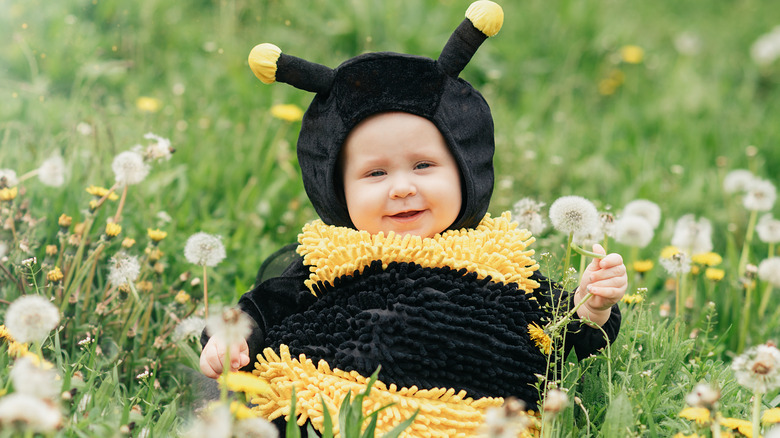Science Says Summer Babies Are More Likely To Have This Trait
Summertime babies come with a lot more than sunshine, school vacations, and lazy beach days. Of all the biological and environmental factors that can influence the development of our individuality, science tells us that our birth month may also be one of them.
University of Connecticut social scientist Mark Hamilton believes there are links to be found between a person's personality and the month in which they were born (via Penn State). While these characteristics won't be universal to all summer babies, studies have revealed patterns that tend to emerge among those born within the summer season.
Of the many benefits to be gained for those born in the months of June, July, and August, being taller and less prone to allergies may also be among them. Physical health benefits aside, however, summer babies possess one particular trait that's unique to their emotional and mental wellness.
Summer babies and mental health
A 2014 study published in European Neuropsychopharmacology explains how seasons have a biological effect on our serotonin and dopamine production, both of which play a role in mood regulation. In the study, it was discovered that summer babies are more likely to display cyclothymic temperament. In other words, they are more likely to experience mild mood swings. Professor Eduard Vieta elaborated on these findings stating, "Although both genetic and environmental factors are involved in one's temperament, now we know that the season at birth plays a role too. And the finding of 'high mood' tendency (hyperthymic temperament) for those born in summer is quite intriguing" (via ECNP).
So how does this relate to mental health? As it turns out, even with the potential presence of mood swings, summer babies are not more prone to mental health disorders. A 2012 study published in PLOS ONE examining the relationship between birth season and psychiatric disorders found that August babies had lower rates of bipolar disorder. In fact, summer babies are more likely to exude positivity. So for parents-to-be, you may soon find that your summer baby is exactly that — a ray of sunshine!
But, back to the physical benefits of being a summer baby. How does being born in the warmer months affect your child's health?
Summer babies, height, and weight
Your weight at birth, your age when you hit puberty, and your height as an adult could all possibly be determined by your birth season, according to a 2015 study published in the journal Heliyon. The research, which involved almost half a million people in the U.K., found that women born in the bright and cheery months (June, July, and August, specifically) weighed more and grew up to be taller as adults. They also hit puberty a little later than their counterparts born in the colder months of the year.
Researchers point toward the effect sunlight has on your body and health, even if you're reaping the benefits via your mother while still in the womb. "We don't know the mechanisms that cause these season of birth patterns on birth weight, height, and puberty timing ... We think that vitamin D exposure is important and our findings will hopefully encourage other research on the long-term effects of early life vitamin D on puberty timing and health," explained the lead author of the study, Dr. John Perry (via Science Daily).
Vitamin D, primarily derived from sunlight converting a chemical in your skin into calciferol (the active form of vitamin D), can also be found in fortified dairy, cereals, fatty fish, and supplements. It's an essential nutrient for bone health as it helps your body absorb calcium. A 2022 study published in the journal Nutrients found that vitamin D deficiency was a factor in height growth decline in children with either short or normal stature.
Summer babies and allergies
According to a 2016 study published in the European Journal of Allergy and Clinical Immunology, whether you're prone to allergies may have something to do with your birth season. In fact, the idea that summer babies might be less at risk of developing allergies is not a new one. However, the 2016 study looked into the reasoning behind this phenomenon. According to Gabrielle Lockett, a postdoctoral research fellow in the faculty of medicine at England's University of Southampton and lead author of the study (via How Stuff Works), your epigenetic marks (chemical modifications on DNA), can be altered by environmental exposures (like the season of your birth), which, in turn, could influence your gene expression.
Researchers have also found that the type of allergies you'd have, based on your birth month, is not restricted to seasonal allergies. "For decades, studies have shown that people born in autumn and winter are at increased risk of not only rhinitis (hay fever), but also food allergy, asthma and eczema," explained Lockett. "[However], one large Dutch study found that people born in autumn and winter were at increased risk of having immune responses to non-seasonal allergens (such as egg white and cow's milk) as well as to seasonal allergens (pollen, cat, dog, and house dust mite)." Again, the idea is that low vitamin D levels in the colder months could be the reason for a higher risk of allergies. There could also be something about what fruits and vegetables are available in the summer that helps mitigate the risk for summer babies.




